|
If this message is not displayed correctly, please click here.
|
The Dancing Economist | Autumn 2025 |
|
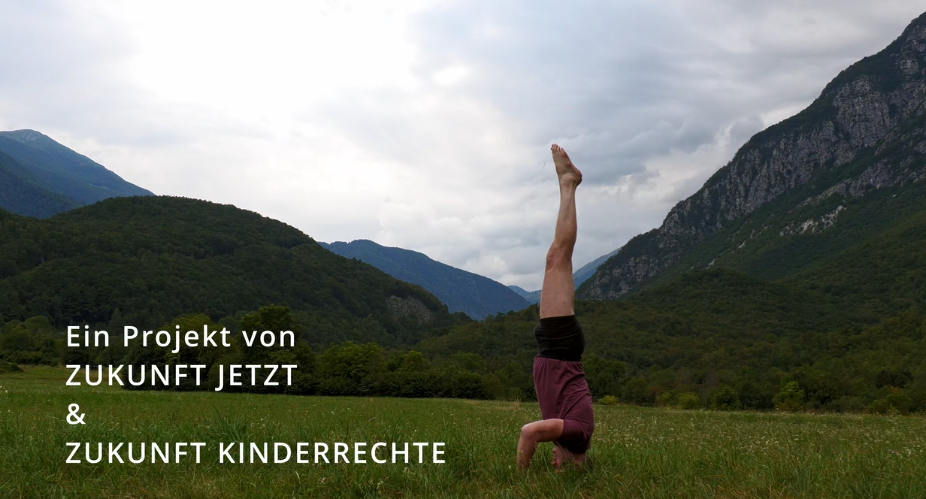 2025 is also so busy and eventful that I am just managing to compose this compact newsletter. Looking back, it is hard to believe everything that has been achieved and worked out. It is also surprising how right I am with my proposal to defuse the state of emergency in my current book “In Praise of Fundamental Rights” (so far only in German: "Lob der Grundrechte"): US President Donald Trump is attempting to legitimize not few of his destructive acts with two completely outdated emergency rules, the Alien Enemies Act of 1798 and the Resurrection Act of 1807. This makes it all the more important that the democratic sovereign soon gains sovereignty over the constitution in order to be able to carry out such long-overdue clear-outs and to anchor overdue passages, such as a ban on wars of aggression for the government and parliament, in democratic constitutions. In a TEDx talk (Saarbrigge) in English that will be online very soon, I will elaborate on these thoughts that are currently maturing. 2025 is also so busy and eventful that I am just managing to compose this compact newsletter. Looking back, it is hard to believe everything that has been achieved and worked out. It is also surprising how right I am with my proposal to defuse the state of emergency in my current book “In Praise of Fundamental Rights” (so far only in German: "Lob der Grundrechte"): US President Donald Trump is attempting to legitimize not few of his destructive acts with two completely outdated emergency rules, the Alien Enemies Act of 1798 and the Resurrection Act of 1807. This makes it all the more important that the democratic sovereign soon gains sovereignty over the constitution in order to be able to carry out such long-overdue clear-outs and to anchor overdue passages, such as a ban on wars of aggression for the government and parliament, in democratic constitutions. In a TEDx talk (Saarbrigge) in English that will be online very soon, I will elaborate on these thoughts that are currently maturing.
.
|
|
|
- Democracy: Book "In Praise of Fundamental Rights" (German), TEDx Saarbrigge
- Ethical World Trade: Study translated into German; media coverage
- Money: AEMS panel "Financing the green transition", opinion piece on MMT, Symposium on the reform of the monetary system in Berlin
- Economy for the Common Good: 15th anniversary; Beyond GDP at WU Vienna
- Travel & People: Meeting with Satish Kumar in Spain; 2nd trip to Japan (Tokyo)
- Preview of 2026
- Take action!
|
|
|
New book "Lob der Grundrechte" (In Praise of Fundamental Rights)
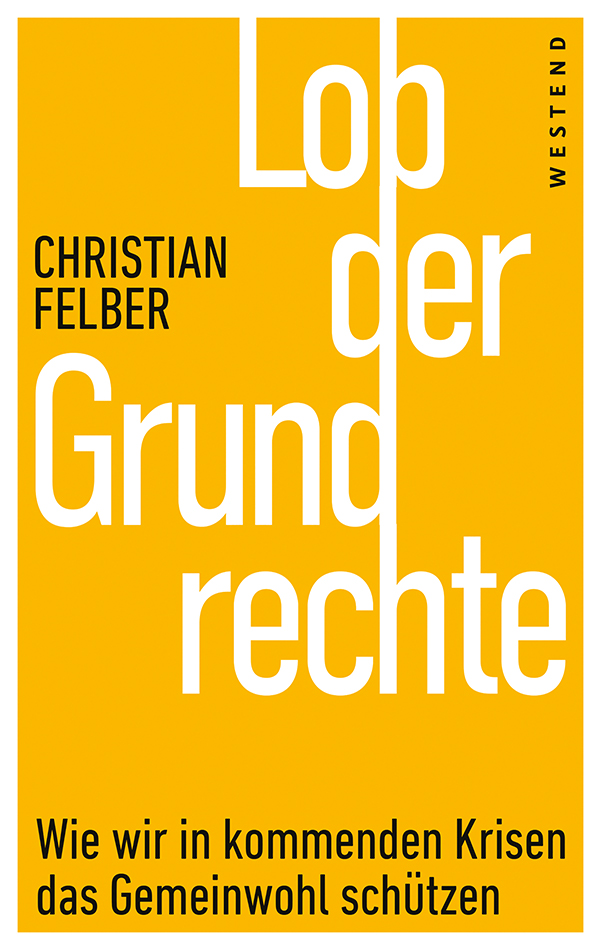 After five years of intensive and interdisciplinary research focusing on discourse analysis and holistic health, ‘Lob der Grundrechte’ (In Praise of Fundamental Rights) was published in February. With 680 footnotes, it is my most thoroughly researched book. I show that there were and are alternatives to authoritarian crisis management, that restrictions on fundamental rights, their collateral damage and the division of society were avoidable – and how they can be avoided in the future. Above all, however, I make concrete proposals for the further development of the system of fundamental and human rights and for the democratic taming of the state of emergency, so that we can preserve social cohesion and the common good in future crises. After five years of intensive and interdisciplinary research focusing on discourse analysis and holistic health, ‘Lob der Grundrechte’ (In Praise of Fundamental Rights) was published in February. With 680 footnotes, it is my most thoroughly researched book. I show that there were and are alternatives to authoritarian crisis management, that restrictions on fundamental rights, their collateral damage and the division of society were avoidable – and how they can be avoided in the future. Above all, however, I make concrete proposals for the further development of the system of fundamental and human rights and for the democratic taming of the state of emergency, so that we can preserve social cohesion and the common good in future crises.
→ Book „Lob der Grundrechte“ (German, February 2025)
→ Trailer for the Documentary Film based on the book (upcoming)
|
|
|
TEDx Saarbrigge on the future of democracy
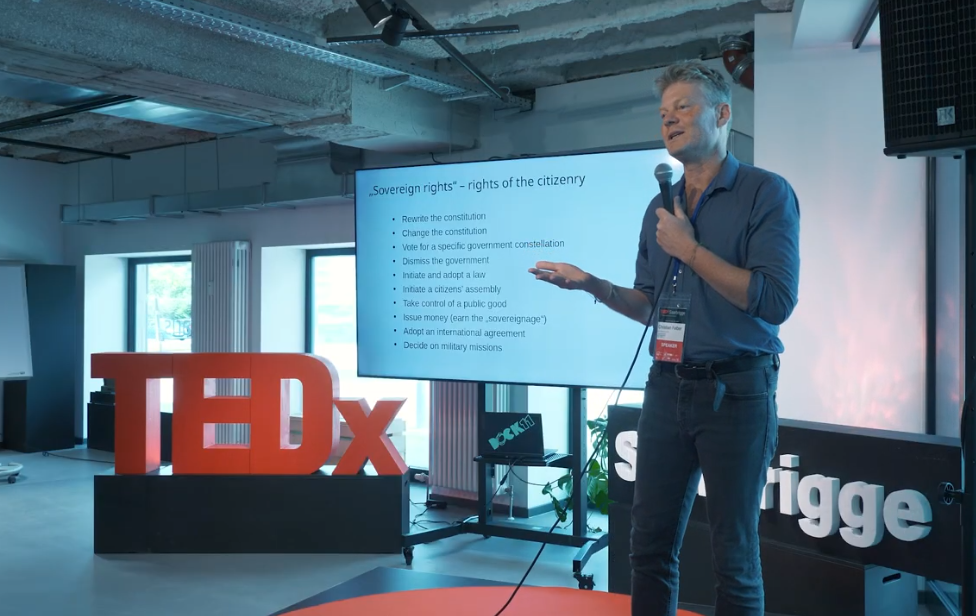 I was invited to TEDx Saarbrigge 2025 on the future of democracy in the digital era. My contribution (in English) is about the concept of a "Common Good Democracy" or "Sovereign Democracy" (very much different from that one occasionally discussed in Russia, which is no democracy at all, but an electoral autocracy, according to V-Dem). Common Good Democracy would be a deeper, stronger and more participatory and direct form of democracy than a liberal democracy - the best existing form of democracy. Thanks to the new form of democracy, peace, citizens' participation and true "sovereignty" (of the people) would have a chance. My talk will be published on Youtube very soon (most probably in November 2025). I was invited to TEDx Saarbrigge 2025 on the future of democracy in the digital era. My contribution (in English) is about the concept of a "Common Good Democracy" or "Sovereign Democracy" (very much different from that one occasionally discussed in Russia, which is no democracy at all, but an electoral autocracy, according to V-Dem). Common Good Democracy would be a deeper, stronger and more participatory and direct form of democracy than a liberal democracy - the best existing form of democracy. Thanks to the new form of democracy, peace, citizens' participation and true "sovereignty" (of the people) would have a chance. My talk will be published on Youtube very soon (most probably in November 2025).
→ TEDx Saarbrigge 2025 ("Democracy in the digital era")
|
|
|
Study now alo awailable in German
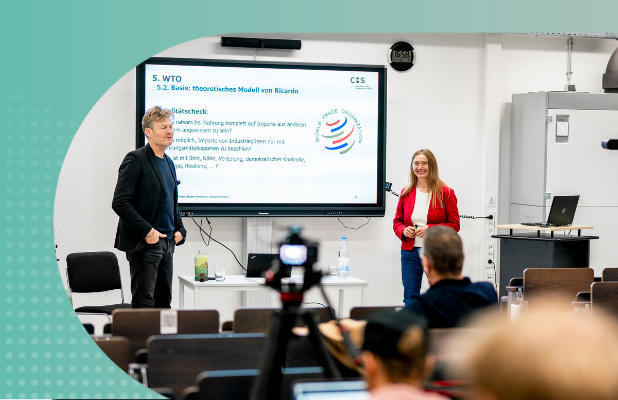 The peer-reviewed CBS Working Paper „A New Paradigm for the EU's Global Trade Strategy: Ethical World Trade and Economy for the Common Good", that I co-authored with Prof. Brigitta Hermann and Jürgen Knirsch and published originally in November 2024, has now been released also in German. Centerpiece of the proposal of an alternative to free trade and protectionism is a United Nations Ethical Trade Zone (UNETZ) could succeed in its third attempt, from a historical perspective. ITO failed in 1944, UNCTAD came to life in 1964, but did not (yet) become the global regulatory body for trade rules. → Press release (German, 31 October 2025)
→ English version of the Working Paper on the CBS website (September 2025) |
|
|
Media coverage
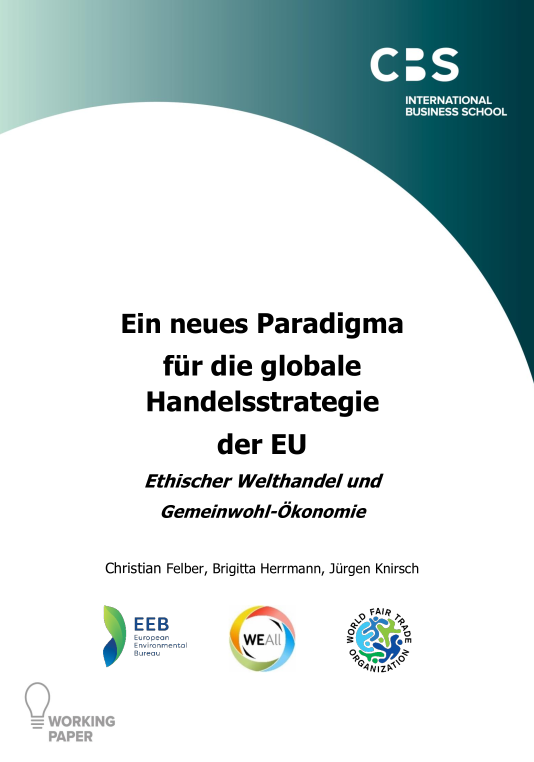 In July, Henry Leveson-Gower interviewed me for the Mint Magazine on the study. In the same month, a large interview (three-quarters of a page) appeared in the Süddeutsche Zeitung, one of Germany's top newspapers. The topics ranged as far as world peace, but ethical world trade, which would be based at the UN, is consistently linked to the core issues of the UN and promotes peace, human rights and democracy – in contrast to free trade. So the broad conversation was consistent while connecting hot spots. Already in May, I could place an opinion piece in the Austrian "Kurier". → Kurier (6 May 2025) → Mint Magazine (4 July 2025) → Süddeutsche Zeitung (21 July 2025) |
|
|
Financing the green transition
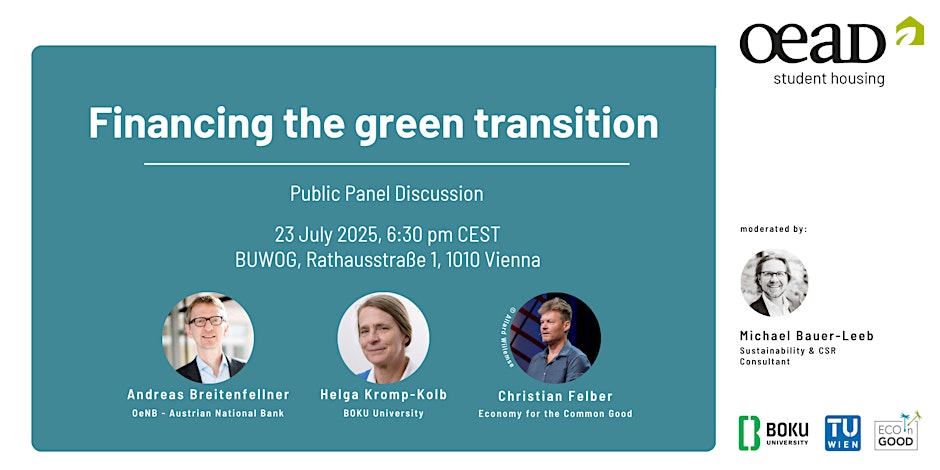 As part of this year's Alternative Economic and Monetary Systems (AEMS) Summer School, where I have been teaching about the economy for the common good, money as a public good and the sovereign money reform from the outset, an interesting public discussion took place with Helga Kromp-Kolb (Austrian Scientist of the Year 2005), Andreas Breitenfellner (Austrian National Bank, senior expert) and myself. I focused on the positive money reform and Modern Money Theory (MMT) – two additional ways to finance socio-ecological transformation, alongside a substantial wealth and inheritance tax. A second hot spot was the reformability and willingness to shift to more holistic and sustainable monetary policies of central banks. → Panel discussion (starts at min. 7:50) → "Money. The New Rules of the Game" (Springer, 2017) |
|
|
Modern Monetary Theory (MMT)
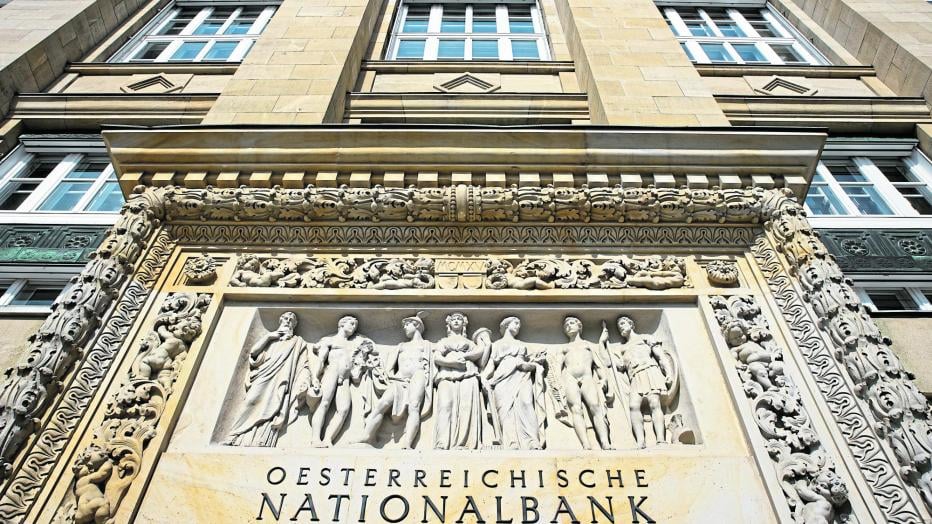 At the end of last year, the Kurier newspaper published a guest commentary on modern monetary theory using Austria as an example. If three-quarters of the national debt (currently 80% of GDP) were replaced by interest-free loans from the country's own ‘house bank’, this would save €27 billion in government spending over four years. This is an opportunity that the state should not miss, both to relieve the burden on the general public and to consolidate the budget. However, this requires abandoning economic and political doctrines and amending the EU Treaty. → Opinion piece in "Kurier" (29 December 2024) |
|
|
Symposium on the reform of the money system in Berlin
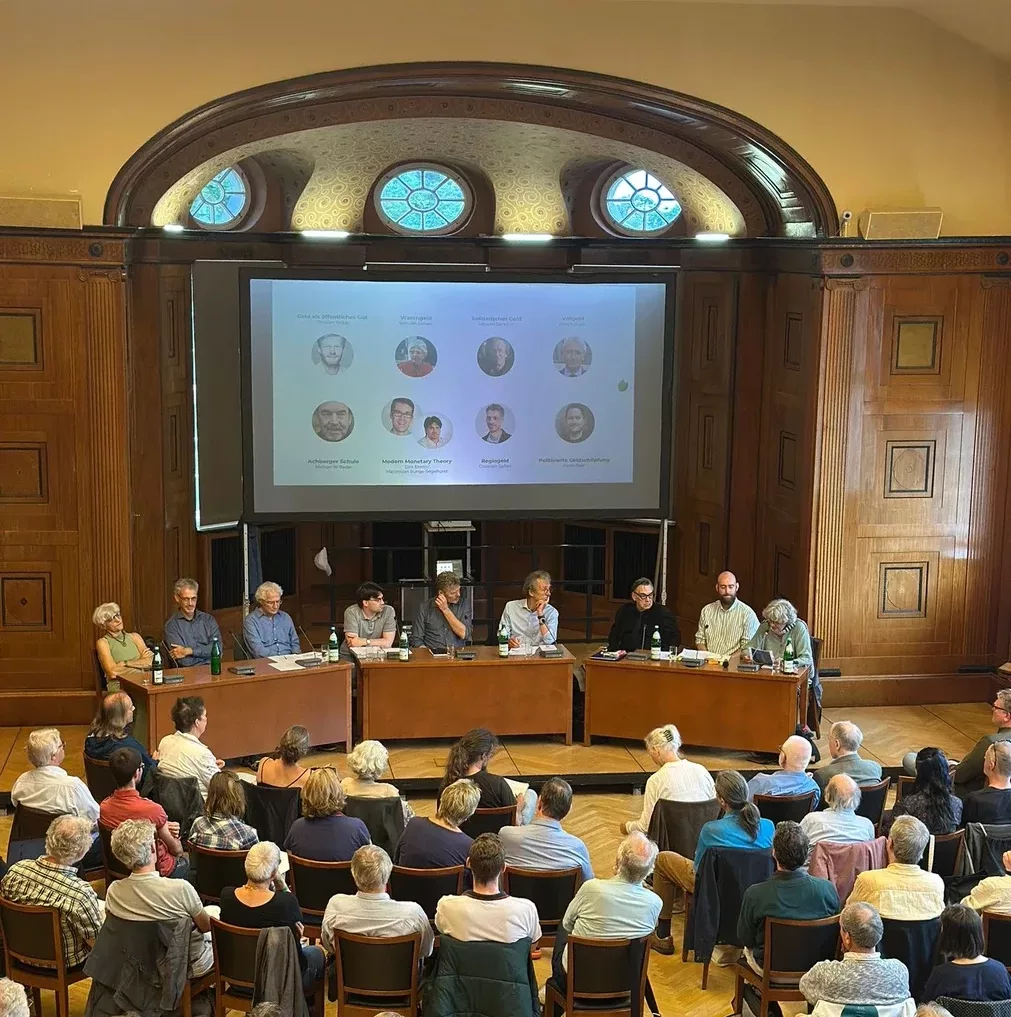 In June, a group of monetary reformers organised the first Monetary Reform Symposium at Treptow Town Hall in Berlin. Represented were positive money, MMT, local currencies, solidarity economy and ‘money as a public good’ as my contribution, based on my book "Money. The New Rules of the Gam". We also launched the first ‘Democratic Money Convention’, which could one day redefine the cornerstones of the monetary system. The whole symposium was in German. Click the following link for a review. → Report and Aftermovie (July 2025) |
|
IV. Economy for the Common Good
|
|
15th anniversary of the
Economy for the Common Good
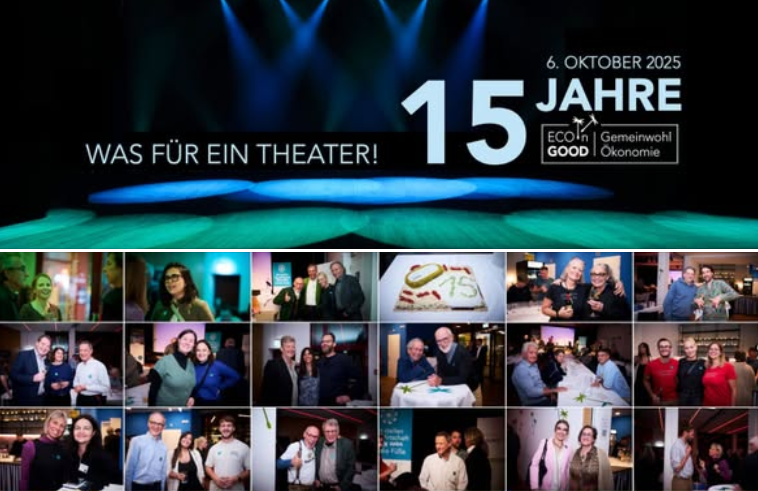
The international Economy for the Common Good movement was launched on 6 October 2010 in Vienna, following almost two years of preparation within Attac Austria. The biggest celebration to date was the Economy for the Common Good Festival in February 2016, with 900 guests at the Vienna Volkstheater. Since then, the movement has become much more international, and we have not held any more central celebrations. On 6 October 2025, we celebrated 15 years since the movement was founded in Vienna. Among many other contributions, I gave a short retrospective (12 min.). The following weekend, ECG Bavaria celebrated its 10th anniversary together with the 15th anniversary of the entire movement. We learned that the very first ECG event took place in spring 2020 in Mangfangtal, the home of Harro Colshorn, a veteran of ECG Bavaria. The history of GWÖ needs to be slightly adjusted.... → Review of celebration in Vienna (ECG Austria) → Review of celebration at Schloss Blumenthal (ECG Bavariaria) |
|
Beyond GDP at Vienna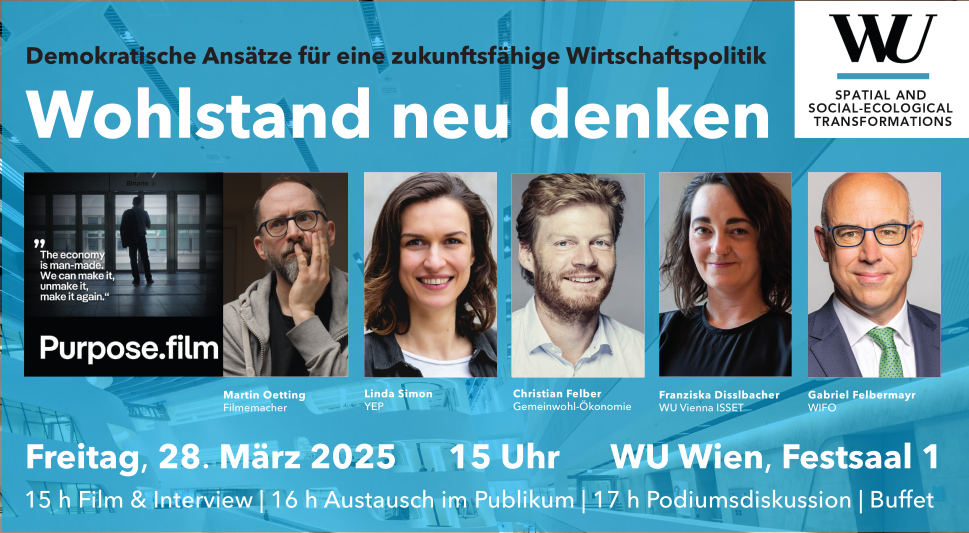 University University
of Economics and Business (WU)
On the occasion of Martin Oetting's film ‘Purpose’, ECOnGOOD Austria organised the event ‘Rethinking Prosperity’ in collaboration with the ISSET of Vienna University of Economics and Business. We presented the Common Good Product as a successor to GDP, and Wifo Director Gabriel Felbermayr honoured us with his presence at the panel discussion – also with a proposal to continue the discussion at WU and with Wifo. The democratic composition of the GDP successor is emerging as one of the core contributions of the ECG movement to the Beyond GDP discourse. Another pilot project was launched in Vienna Floridsdorf in September.. → Review event (March 2025) → Common Good Compass Floridsdorf (German, September 2025) |
|
|
Meeting with Satish Kumar in Spain
 On the invitation of a common friend, I met Satish Kumar in the Sierra de Gredos in Spain. Satish, a student of Gandhi, is likewise inspiring. He once undertook a peace march from Dehli to Washington, without money and without luggage. Already in Pakistan, a personal fan offered a ride, but Satishdeclined: His mission was to arrive walking - step by step, without hurry. The walk took two years. He arrived safely, the only country who put him to prison for some days was France. Satish is co-founder of Schumacher College in UK and of the Resurgence Trust. He served as an editor of the journal Resurgence & Ecologist for 40 years. Today, he is devoting his life to campaigning for ecological regeneration, social justice and spiritual fulfilment. → Radical Love (Parallax Press 2023)
→ SoMe post with some more pics |
|
|
2nd trip to Japan (Tokyo)
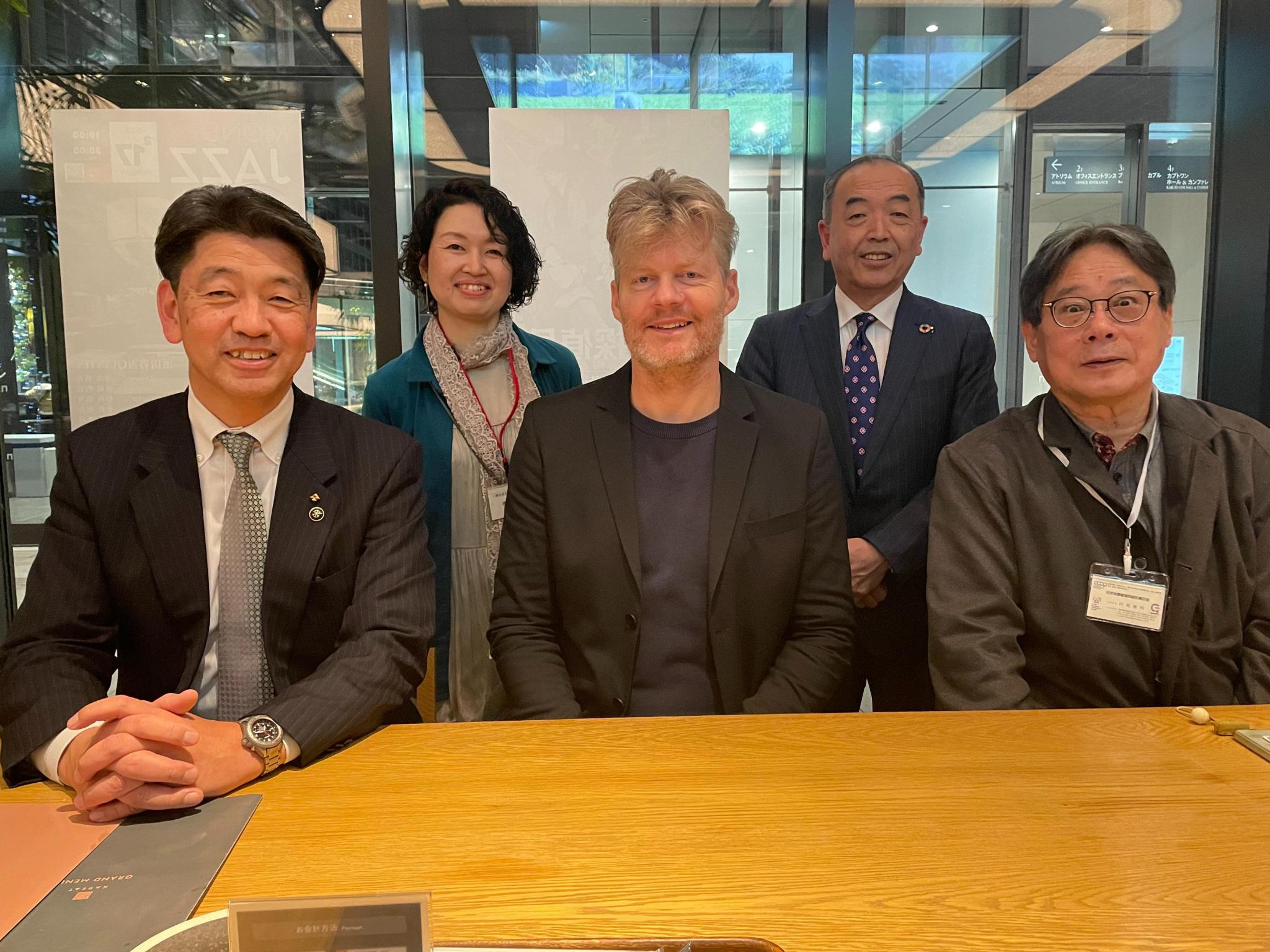 Originally, just one trip was planned to help build ECG in Japan, in early 2025. But spontaneously, a second opportunity popped up: I was invited to give a keynote lecture at the inauguration event of the new Global Risk Center at Nagasaki University. I could not resist the invitation and the opportunity to visit the Atomic Bomb Museum in Nagasaki - an unforgettable experience which I reported in my newsletter 2024. My 2nd travel in early February 2025, this time to Tokyo, was composed by a multiple set of formats – for all relevant stakeholders of the young ECG movement in Japan. One activity was a meeting with Japanese ECG members. The second event was a public workshop for appliers: businesses, municipalities and non-profits. A highlight was the continuation of the exchange with students from Globis University, supervised by Prof. Naoyuki Honmura. Finally, there was a public presentation of the model and movement, and another media interview. All in all, an interdisciplinary and intersectoral festival of activities. → Report on both tours (December 2024 and February 2025) |
|
ECGIC 2026 in Amberg (BAY)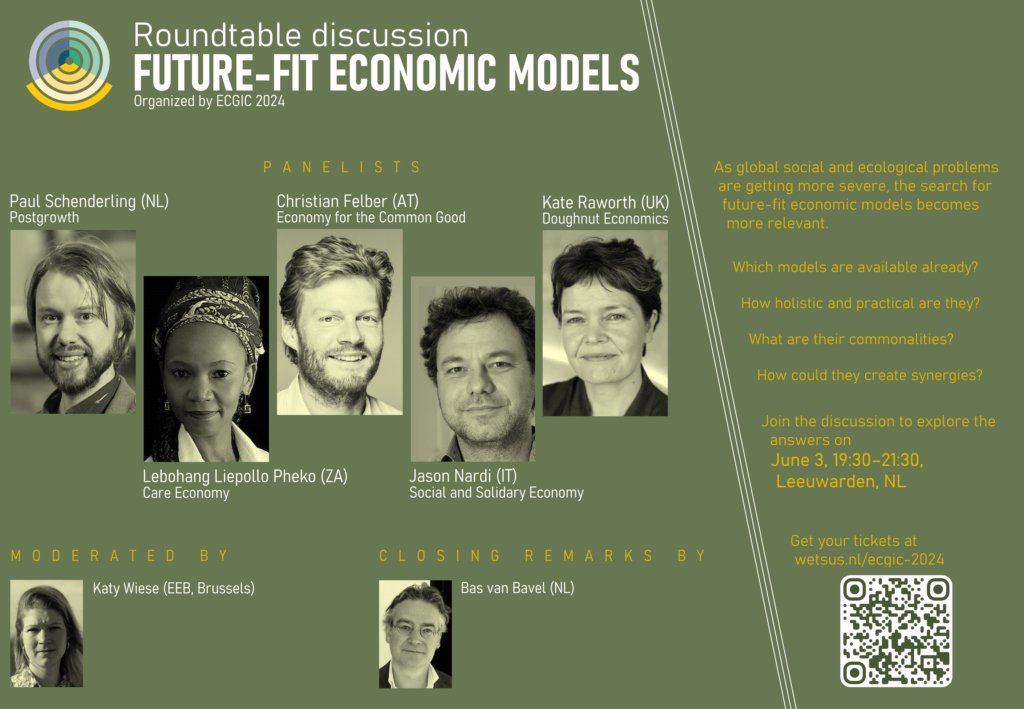
After Bremen (2019), Valencia (2022) and Leeuwarden (2024), the 4th International Science Conference of the Economy for the Common Good Movement will take place in Amberg (Bavaria/Germany) from 10 to 12 June 2026. The four host organisations are OTH Amberg-Weiden, BayZen, the University of West Bohemia and the International Federation for the Economy for the Common Good. As in Holland last year, participants can expect a wide variety of highlights in Circular, Social & Solidary and Common Good Economy and Economics. Day 1 will be dedicated to theory, Day 2 to practice, and Day 3 to transformation. → ECGIC 2026 (Call for Abstracts until 31 October 2025; if you read this, until November 4th) → ECGIC 2024 (Review with the round table on future-fit economic models) |
|
|
|
Become a member of ECOnGOOD or donate!
The Economy for the Common Good is a sustainable economic model for the future. You can now become a member of your regional or national association and/or provide financial support.:
→ Become a member
→ Donate for ECOnGOOD
|
|
|
|
Support Christian's work!
To be honest, 2025 was - in financial terms - a very difficult year, for diverse reasons. In case you are willing to support the study on Ethical World Trade or the book or the film on fundamental rights, you are welcome to contact me directly.
→ Support Christian
|
|
|
Wenn Sie diese E-Mail (an: christian.felber@econgood.org) nicht mehr empfangen möchten, können Sie diese hier kostenlos abbestellen.
Christian Felber
Postfach 30
1072 Wien
Österreich
info@christian-felber.at
http://christian-felber.at
CEO: Christian Felber
Tax ID: ATU56359327
Datenschutz ist uns wichtig: Die gesammelten Daten werden ausschließlich zur Aussendung unseres Newsletters erhoben und nicht an Dritte weitergegeben. Wir verwenden ein Double-Opt-In Verfahren für Ihre Anmeldung und Sie können sich jederzeit, über den Abmeldelink im Newsletter, wieder abmelden.
Hier finden Sie die Datenschutzbestimmungen von Cleverreach.
|

 2025 is also so busy and eventful that I am just managing to compose this compact newsletter. Looking back, it is hard to believe everything that has been achieved and worked out. It is also surprising how right I am with my proposal to defuse the state of emergency in my current book “In Praise of Fundamental Rights” (so far only in German: "Lob der Grundrechte"): US President Donald Trump is attempting to legitimize not few of his destructive acts with two completely outdated emergency rules, the Alien Enemies Act of 1798 and the Resurrection Act of 1807. This makes it all the more important that the democratic sovereign soon gains sovereignty over the constitution in order to be able to carry out such long-overdue clear-outs and to anchor overdue passages, such as a ban on wars of aggression for the government and parliament, in democratic constitutions. In a TEDx talk (Saarbrigge) in English that will be online very soon, I will elaborate on these thoughts that are currently maturing.
2025 is also so busy and eventful that I am just managing to compose this compact newsletter. Looking back, it is hard to believe everything that has been achieved and worked out. It is also surprising how right I am with my proposal to defuse the state of emergency in my current book “In Praise of Fundamental Rights” (so far only in German: "Lob der Grundrechte"): US President Donald Trump is attempting to legitimize not few of his destructive acts with two completely outdated emergency rules, the Alien Enemies Act of 1798 and the Resurrection Act of 1807. This makes it all the more important that the democratic sovereign soon gains sovereignty over the constitution in order to be able to carry out such long-overdue clear-outs and to anchor overdue passages, such as a ban on wars of aggression for the government and parliament, in democratic constitutions. In a TEDx talk (Saarbrigge) in English that will be online very soon, I will elaborate on these thoughts that are currently maturing.
 After five years of intensive and interdisciplinary research focusing on discourse analysis and holistic health, ‘Lob der Grundrechte’ (In Praise of Fundamental Rights) was published in February. With 680 footnotes, it is my most thoroughly researched book. I show that there were and are alternatives to authoritarian crisis management, that restrictions on fundamental rights, their collateral damage and the division of society were avoidable – and how they can be avoided in the future. Above all, however, I make concrete proposals for the further development of the system of fundamental and human rights and for the democratic taming of the state of emergency, so that we can preserve social cohesion and the common good in future crises.
After five years of intensive and interdisciplinary research focusing on discourse analysis and holistic health, ‘Lob der Grundrechte’ (In Praise of Fundamental Rights) was published in February. With 680 footnotes, it is my most thoroughly researched book. I show that there were and are alternatives to authoritarian crisis management, that restrictions on fundamental rights, their collateral damage and the division of society were avoidable – and how they can be avoided in the future. Above all, however, I make concrete proposals for the further development of the system of fundamental and human rights and for the democratic taming of the state of emergency, so that we can preserve social cohesion and the common good in future crises. I was invited to TEDx Saarbrigge 2025 on the future of democracy in the digital era. My contribution (in English) is about the concept of a "Common Good Democracy" or "Sovereign Democracy" (very much different from that one occasionally discussed in Russia, which is no democracy at all, but an electoral autocracy, according to V-Dem). Common Good Democracy would be a deeper, stronger and more participatory and direct form of democracy than a liberal democracy - the best existing form of democracy. Thanks to the new form of democracy, peace, citizens' participation and true "sovereignty" (of the people) would have a chance. My talk will be published on Youtube very soon (most probably in November 2025).
I was invited to TEDx Saarbrigge 2025 on the future of democracy in the digital era. My contribution (in English) is about the concept of a "Common Good Democracy" or "Sovereign Democracy" (very much different from that one occasionally discussed in Russia, which is no democracy at all, but an electoral autocracy, according to V-Dem). Common Good Democracy would be a deeper, stronger and more participatory and direct form of democracy than a liberal democracy - the best existing form of democracy. Thanks to the new form of democracy, peace, citizens' participation and true "sovereignty" (of the people) would have a chance. My talk will be published on Youtube very soon (most probably in November 2025). The peer-reviewed CBS Working Paper „A New Paradigm for the EU's Global Trade Strategy: Ethical World Trade and Economy for the Common Good", that I co-authored with Prof. Brigitta Hermann and Jürgen Knirsch and published originally in November 2024, has now been released also in German. Centerpiece of the proposal of an alternative to free trade and protectionism is a United Nations Ethical Trade Zone (UNETZ) could succeed in its third attempt, from a historical perspective. ITO failed in 1944, UNCTAD came to life in 1964, but did not (yet) become the global regulatory body for trade rules.
The peer-reviewed CBS Working Paper „A New Paradigm for the EU's Global Trade Strategy: Ethical World Trade and Economy for the Common Good", that I co-authored with Prof. Brigitta Hermann and Jürgen Knirsch and published originally in November 2024, has now been released also in German. Centerpiece of the proposal of an alternative to free trade and protectionism is a United Nations Ethical Trade Zone (UNETZ) could succeed in its third attempt, from a historical perspective. ITO failed in 1944, UNCTAD came to life in 1964, but did not (yet) become the global regulatory body for trade rules. In July, Henry Leveson-Gower interviewed me for the Mint Magazine on the study. In the same month, a large interview (three-quarters of a page) appeared in the Süddeutsche Zeitung, one of Germany's top newspapers. The topics ranged as far as world peace, but ethical world trade, which would be based at the UN, is consistently linked to the core issues of the UN and promotes peace, human rights and democracy – in contrast to free trade. So the broad conversation was consistent while connecting hot spots. Already in May, I could place an opinion piece in the Austrian "Kurier".
In July, Henry Leveson-Gower interviewed me for the Mint Magazine on the study. In the same month, a large interview (three-quarters of a page) appeared in the Süddeutsche Zeitung, one of Germany's top newspapers. The topics ranged as far as world peace, but ethical world trade, which would be based at the UN, is consistently linked to the core issues of the UN and promotes peace, human rights and democracy – in contrast to free trade. So the broad conversation was consistent while connecting hot spots. Already in May, I could place an opinion piece in the Austrian "Kurier". As part of this year's Alternative Economic and Monetary Systems (AEMS) Summer School, where I have been teaching about the economy for the common good, money as a public good and the sovereign money reform from the outset, an interesting public discussion took place with Helga Kromp-Kolb (Austrian Scientist of the Year 2005), Andreas Breitenfellner (Austrian National Bank, senior expert) and myself. I focused on the positive money reform and Modern Money Theory (MMT) – two additional ways to finance socio-ecological transformation, alongside a substantial wealth and inheritance tax. A second hot spot was the reformability and willingness to shift to more holistic and sustainable monetary policies of central banks.
As part of this year's Alternative Economic and Monetary Systems (AEMS) Summer School, where I have been teaching about the economy for the common good, money as a public good and the sovereign money reform from the outset, an interesting public discussion took place with Helga Kromp-Kolb (Austrian Scientist of the Year 2005), Andreas Breitenfellner (Austrian National Bank, senior expert) and myself. I focused on the positive money reform and Modern Money Theory (MMT) – two additional ways to finance socio-ecological transformation, alongside a substantial wealth and inheritance tax. A second hot spot was the reformability and willingness to shift to more holistic and sustainable monetary policies of central banks. At the end of last year, the Kurier newspaper published a guest commentary on modern monetary theory using Austria as an example. If three-quarters of the national debt (currently 80% of GDP) were replaced by interest-free loans from the country's own ‘house bank’, this would save €27 billion in government spending over four years. This is an opportunity that the state should not miss, both to relieve the burden on the general public and to consolidate the budget. However, this requires abandoning economic and political doctrines and amending the EU Treaty.
At the end of last year, the Kurier newspaper published a guest commentary on modern monetary theory using Austria as an example. If three-quarters of the national debt (currently 80% of GDP) were replaced by interest-free loans from the country's own ‘house bank’, this would save €27 billion in government spending over four years. This is an opportunity that the state should not miss, both to relieve the burden on the general public and to consolidate the budget. However, this requires abandoning economic and political doctrines and amending the EU Treaty. In June, a group of monetary reformers organised the first Monetary Reform Symposium at Treptow Town Hall in Berlin. Represented were positive money, MMT, local currencies, solidarity economy and ‘money as a public good’ as my contribution, based on my book "Money. The New Rules of the Gam". We also launched the first ‘Democratic Money Convention’, which could one day redefine the cornerstones of the monetary system. The whole symposium was in German. Click the following link for a review.
In June, a group of monetary reformers organised the first Monetary Reform Symposium at Treptow Town Hall in Berlin. Represented were positive money, MMT, local currencies, solidarity economy and ‘money as a public good’ as my contribution, based on my book "Money. The New Rules of the Gam". We also launched the first ‘Democratic Money Convention’, which could one day redefine the cornerstones of the monetary system. The whole symposium was in German. Click the following link for a review.
 University
University On the invitation of a common friend, I met Satish Kumar in the Sierra de Gredos in Spain. Satish, a student of Gandhi, is likewise inspiring. He once undertook a peace march from Dehli to Washington, without money and without luggage. Already in Pakistan, a personal fan offered a ride, but Satishdeclined: His mission was to arrive walking - step by step, without hurry. The walk took two years. He arrived safely, the only country who put him to prison for some days was France. Satish is co-founder of Schumacher College in UK and of the Resurgence Trust. He served as an editor of the journal Resurgence & Ecologist for 40 years. Today, he is devoting his life to campaigning for ecological
On the invitation of a common friend, I met Satish Kumar in the Sierra de Gredos in Spain. Satish, a student of Gandhi, is likewise inspiring. He once undertook a peace march from Dehli to Washington, without money and without luggage. Already in Pakistan, a personal fan offered a ride, but Satishdeclined: His mission was to arrive walking - step by step, without hurry. The walk took two years. He arrived safely, the only country who put him to prison for some days was France. Satish is co-founder of Schumacher College in UK and of the Resurgence Trust. He served as an editor of the journal Resurgence & Ecologist for 40 years. Today, he is devoting his life to campaigning for ecological Originally, just one trip was planned to help build ECG in Japan, in early 2025. But spontaneously, a second opportunity popped up: I was invited to give a keynote lecture at the inauguration event of the new Global Risk Center at Nagasaki University. I could not resist the invitation and the opportunity to visit the Atomic Bomb Museum in Nagasaki - an unforgettable experience which I reported in my newsletter 2024.
Originally, just one trip was planned to help build ECG in Japan, in early 2025. But spontaneously, a second opportunity popped up: I was invited to give a keynote lecture at the inauguration event of the new Global Risk Center at Nagasaki University. I could not resist the invitation and the opportunity to visit the Atomic Bomb Museum in Nagasaki - an unforgettable experience which I reported in my newsletter 2024.

